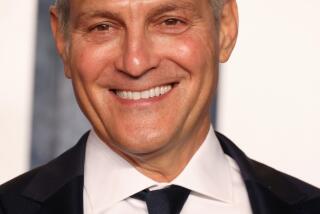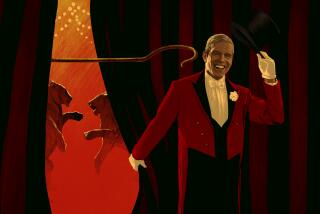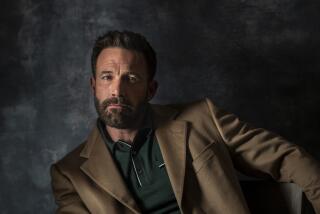Air America’s difficult birth, caught on film
- Share via
Air America Radio, the left-wing talk-radio venture featuring Al Franken, Randi Rhodes and Janeane Garofalo, celebrates its first anniversary on the air this week, and HBO is giving it a rather macabre gift to mark the occasion: a searing, warts-and-all documentary showing just how perilously close the fledgling network came to oblivion in its first weeks.
“Left of the Dial,” which premieres on HBO on Thursday (8 p.m.), was supposed to be a relatively benign insider’s account of the launch of Air America, which was in turn intended to be both a counterweight to the dominance of conservative voices in talk radio and proof that there is a market for left-wing voices in the heartland.
Neither project turned out quite as expected. Instead of a triumphant beginning and universal acclaim, the new network found itself tossed off the air in Los Angeles and Chicago and teetering on the brink of bankruptcy just weeks after its launch, owing to what the film portrays as the murky financial doings of Evan Cohen, the network’s co-founder and one of its primary investors.
And instead of an entertaining political documentary on a plucky band of liberal dreamers, New York filmmakers Patrick Farrelly and Kate O’Callaghan wound up telling a gripping tale of incompetence, betrayal and perseverance as their subjects struggled to keep one of the most overhyped media launches from crumbling around them.
“I knew one way or another we were going to get a good documentary,” said O’Callaghan, who with her husband, Farrelly, worked as a producer for Michael Moore’s “TV Nation.” “We knew there was something really weird going on. In a strange way it was an upside, but we were strongly rooting for them as well. We had grown close to them, and we didn’t want them to fail. But we were thinking, ‘We’ve got to get this.’ ”
This is what was going on: In April 2004, after two weeks on the air, Air America’s Chicago and Los Angeles affiliates booted the network because checks to pay for airtime had bounced.
Cohen, a frenetic, gregarious businessman who is rarely seen in the film without a cellphone earpiece, portrayed it as a simple business dispute. He denied that any checks had bounced and challenged the claims in court. But even as Air America’s legal battle met initial success -- a judge briefly ordered them back on the air in Chicago -- the true picture began to emerge inside the network’s offices: The first round of paychecks to the staff bounced, group healthcare premiums went unpaid, and creditors began calling.
Cohen, Air America’s investors say, claimed to have invested millions of dollars into the network that never materialized. Just one month into the network’s short life, the investors ousted Cohen and discovered that they had no money.
All with Farrelly’s and O’Callaghan’s cameras rolling.
“Here they were doing the launch of progressive radio -- which is a story in itself -- and now all of a sudden they had a real story,” said Doug Kreeger, one of the network’s investors, who stepped in as chief executive after Cohen’s departure.
The film offers surprising revelations about what was going on inside the heavily publicized start-up.
Aside from an acute lack of organization -- of all the talent and executives, only a handful had any radio experience, and one extended comic sequence involves executive producer Carl Ginsburg’s quixotic attempt to arrange for something as simple as a simulcast of then-National Security Advisor Condoleezza Rice’s testimony before the 9/11 Commission -- “Left of the Dial” captures a company seemingly intoxicated with its own sense of destiny, displaying little regard for the nuts and bolts of the radio business and a fraught relationship with the truth.
“This is not the sign of a company in trouble,” Air America’s general counsel tells a reporter in one scene, exercising damage control after the network’s Chicago and Los Angeles stations were shut down.
In fact, David Goodfriend -- a college acquaintance of Cohen’s and the one responsible for bringing him on board with the company -- did not yet know the extent of the company’s troubles.
Just days later, Goodfriend tells the camera: “We found out there’s a lot less money than Evan said there was. We found out there was no money. It’s not clear to me whose funds went in and whose didn’t. What is clear to me is that we were all pretty misled. All of us -- including me.”
In another scene, Cohen is seen exaggerating the network’s revenue. When the New York Times calls with a question about ad sales, he asks an associate for the gross sales figure and is told, “Right around $639,000 -- pushing $650,000.” Cohen immediately calls the newspaper back and says, “We’re $1 million in sold advertising as of today. That’s a fact, a documentable fact.”
Later, after being told of a $6,000 sale of advertising to Hewlett Packard, Cohen tells someone on the other end of his cellphone: “The good news is that we just sold a Hewlett Packard contract today for April -- $16,000.”
Reached last week by telephone, Cohen declined to comment on the documentary, saying only, “The movie’s made and they edited it the way they edited it. It’s a good story.” Asked what he is doing now, Cohen said, “Taking care of my son.”
The presence of cameras inside the halls of Air America was a mixed blessing: “Left of the Dial” shows the company at its lowest moments but also tells the story of the dedicated staffers who continued to work without paychecks and the executives like Kreeger and then- executive producer (now co-chief operating officer) Ginsburg, who labored feverishly to secure new financing and pay the fledgling company’s mounting bills.
“My whole thing was getting it done,” said Rhodes, the insecure left-wing firebrand who left a successful talk-show perch in South Florida for the New York-based network and is seen in the film competing for attention with Franken, a radio neophyte.
“I instantly went into ‘What do we do now?’ mode. I had to pay people out of my pocket.”
Ironically, given that he is portrayed as the closest thing to a villain in “Left of the Dial,” it was Cohen who granted access to filmmakers Farrelly and O’Callaghan.
“I advised Evan not to let them in,” said Mark Walsh, Air America’s short-lived chief executive, who resigned shortly after the launch, after butting heads with Cohen over financial issues. “I knew from Day 1 having them around was a big mistake. It was a vanity play on his part, and it boomeranged.”
Though Air America had secured an agreement from Farrelly and O’Callaghan that its officials could see a rough cut of the movie and suggest changes, some staffers objected to their presence after Cohen’s departure.
“I have a problem with airing our dirty laundry,” Rhodes said.
“I just remember avoiding them,” said Franken. “Especially when the wheels started to fall off -- I thought, ‘Oy, oy, oy, this is going to look bad.’ ”
Farrelly says tension was thick as he and his wife’s film crew took their cameras through Air America’s Manhattan offices.
“Everyone you’d meet would be giving you the evil eye,” he said. “It was like being a guest in a house where you’re not wanted.”
But with a full year’s perspective -- not to mention financial stability, thanks to a new round of investment this year from RealNetworks Chief Executive Rob Glaser and others -- Air America can look back on its early days as a dark chapter that has closed.
A series of affiliation deals with Clear Channel stations has brought the network to more than 50 markets, including Los Angeles on KTLK-AM (1150), with moderate ratings success in many of those markets. Last week, it was announced that Premier Radio Networks executive vice president Gary Krantz will become the network’s president April 11.
“You can’t run away from your past,” said Jon Sinton, then Air America’s president and now its co-chief operating officer. “It’s the story of the birth of a dream, the sudden near-death of that dream, and its rebirth.
“But it’s not like watching it didn’t make my stomach hurt. I’ve lost both my parents and been through a divorce, and this is definitely in the top three. I just got my invitation to the HBO premiere party, and it’s sort of like being invited to your own firing squad. Gosh, I guess I have to go.”
Not everyone will.
“Oh, my God -- do I want to relive that?” Franken said. “I’d rather watch a Duke basketball game.”


